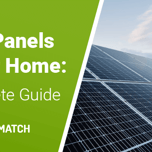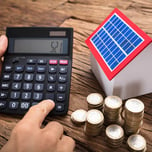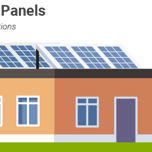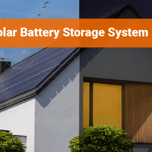
Get up to 4 quotes by filling in only 1 quick form

Slash your energy bills by installing solar panels

We’ve helped over 500,000 homeowners reduce their carbon footprint
- GreenMatch
- Blog
- Solar Panel Cost
What Is the Cost of Solar Panels in the UK?
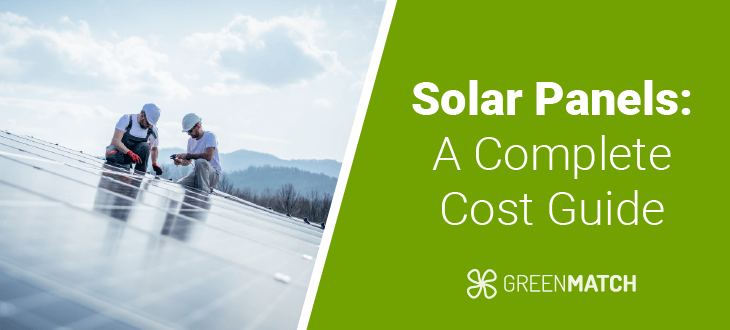
- A 4kW solar panel system costs £6,000 – £8,000, between £400 – £500 per 250W panel.
- You can save up to £729 per year on electricity costs, breaking even in 10 years (4kW system).
- Through the Smart Export Guarantee, you can save up to £767 per year, breaking even in 9 years (4kW system).
- The main factors affecting solar panel costs in the UK include system size, type of solar panels, installation process, additional system components, and location and labour costs.
- Adding a solar battery could help reduce the average homeowner’s electricity bill by as much as 70%.
Solar panels are a great way to produce free electricity for your home, but how much do they cost in the UK and what factors determine their final price? Before making a final decision, in this article, we’ll guide you through the different aspects that you should take into account before purchasing.
In the past few years, significant advancements have been made in solar energy technology, resulting in the cost of solar panels in the UK falling drastically. If you are considering joining thousands of other owners who have switched to an environmentally friendly source of energy while also taking advantage of government schemes such as the Smart Export Guarantee, we recommend you to read this article.
GreenMatch’s network of reliable solar panel manufacturers can provide up to 4 quotes for you to compare and choose all completely for free and without obligation. This save you all the countless hours of internet research that it would usually take if you were to go it alone.
Let us help you make an informed decision about switching to solar energy and find the best installation deal possible.
- Quotes from local engineers
- Payment by finance available
- Save up to £729 per year
It only takes 30 seconds



How much do solar panels cost in the UK?
The cost of solar panels in the UK can range from £5,000 to £11,000, including supply and installation, depending on the size of the system along with other factors.
A standard 250W solar panel in 2023 costs £400 – £500 but can vary depending on the type and size of the whole system. One of the most common domestic sizes is a 4kW solar panel system, which costs around £7,000 and will cover around 29 square metres of your roof.
The system you require may vary based on your energy consumption which is why we’ve broken down the estimated costs for each household size in the table below.
| Cost of solar panels in the UK (supply + installation) | ||||
|---|---|---|---|---|
| House size | System Size | Number of panels | Roof space | Estimated Costs |
| One-bedroom flat | 3kW panel system | 12 | 22m2 | £5,000 – £6,000 |
| 1-2 bedroom house | 4kW panel system | 16 | 29m2 | £6,000 – £8,000 |
| 3 bedroom house | 5kW panel system | 20 | 32m2 | £8,000 – £9,000 |
| 4-5 bedroom house | 6kW panel system | 24 | 43m2 | £9,000 – £11,000 |
The prices we’ve listed are estimates based on industry standards. They offer you a good indication so that you know what to expect. If you’re looking for more accurate and specific pricing for your unique home situation, then we recommend getting quotes from trusted installers.
Get the most competitively priced quotes from up to 4 trusted solar panel installers today and start enjoying the long-term savings that come with renewable energy. Don’t waste hours of your life researching and vetting local installers. Simply complete our 30-second form and can skip to getting quotes. The best part is that any quotes you receive are free and come with no obligation to accept.
- Quotes from local engineers
- Payment by finance available
- Save up to £729 per year
It only takes 30 seconds



How long do solar panels take to pay for themselves?
In the UK, the typical break-even time for solar panels is 9 to 12 years. However, this depends on the size of your solar panel system, the export tariff, your energy consumption and electricity prices at the moment.
Additionally, larger systems are more expensive, but they can generate more electricity and, therefore, can bring you more savings in the long run. A 6kW solar panel system can break even after 9 years, while a 3kW system can take more like 12 years.
You can cut down on your electricity bills with the use of solar panels. The electricity that you use when your panels are active is entirely free, and it can result in annual savings of £486 – £1,107. Of course, the specifications of every household are necessary to be precise in the estimation.
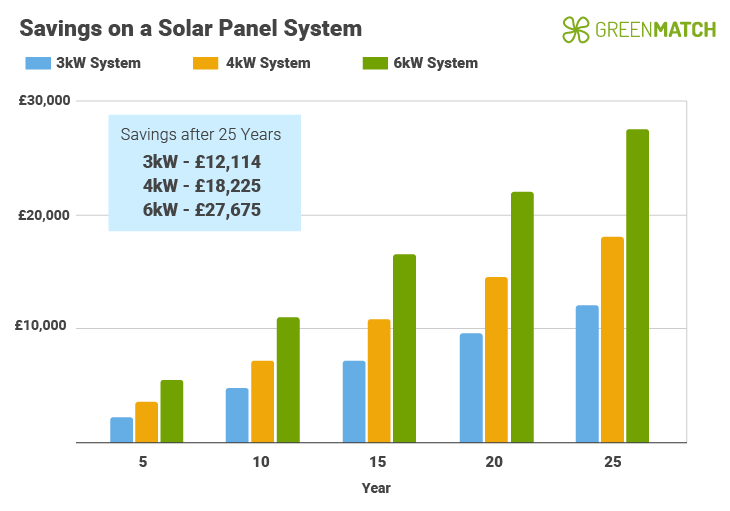
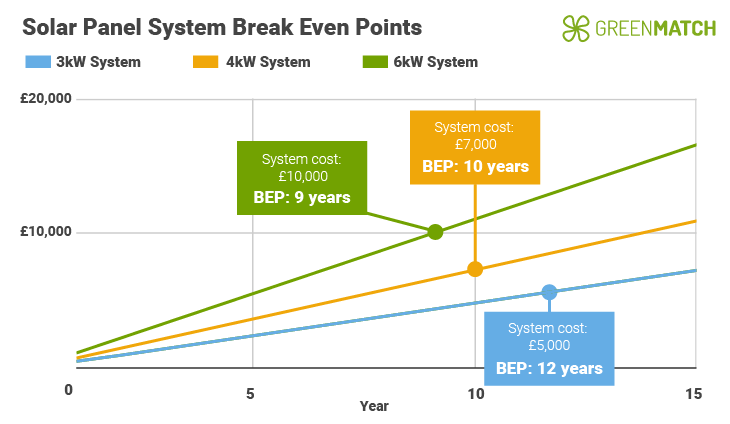
*The figures in this graph are calculated based on 250W panels, the national average household energy consumption (2023), the example SEG tariff rate (5.5p/kWh), and the current price of electricity (Oct 2023). The graph makes a broad estimate and figures may vary according to the size, type, and quality of the solar panel system, as well as export tariffs.
3kW system | £5,000
Average energy consumption: 1,800kWh
- Savings in 1 year: £486
- Savings in 25 years: £12,114
- Break even point: 12 years
4kW system | £7,000
Average energy consumption: 2,700kWh
- Savings in 1 year: £729
- Savings in 25 years: £18,225
- Break even point: 10 years
6kW system | £10,000
Average energy consumption: 4,100kWh
- Savings in 1 year: £1,107
- Savings in 25 years: £27,675
- Break even point: 9 years
Generally, the more electricity your system can generate, the higher the initial installation cost will be. However, the savings will also be higher in the long run. Since April 2022, you can also save VAT on solar panels as the VAT on energy efficient measures was scrapped temporarily by the UK Government.
In addition, solar panel efficiency will also play a part in how much you can save. Monocrystalline panels are more efficient (but also more costly), while polycrystalline panels are less efficient (but cheaper). The more efficient your system is, the more electricity it can generate in a given time.
To protect the lifespan of your panels, ensure you always adhere to solar panel maintenance and cleaning tips.
Solar panel installation cost in the UK detailed
Solar panel installation costs in the UK will also include labour costs. There are two common ways of calculating the labour costs for solar panel installations in the UK.

One way is to calculate approximately £300 – £500 per person, per day. As it usually requires two people to install the system, a final installation fee is normally £600 – £1,000. If you are installing a larger system, it may take more than one day and the costs will naturally rise.
Another way to calculate the labour costs of a solar panel installation is to charge 20 pence per watt. So, for a 4kW system, you would be paying 20 pence for 4000 watts, resulting in £800.

Reduce solar panel costs with SEG payments
In the UK, you can reduce your solar panel costs even more by making use of solar panel grants, like the Smart Export Guarantee (SEG). Through the SEG, you can earn money for exporting surplus solar power that your panels have generated back to the national grid.
The ultimate savings from solar panels comes in the long term when you save money through the Smart Export Guarantee (SEG). Your savings after 25 years including SEG can range from £13,181 to £29,050, depending on your system and tariff.
| Solar panel savings including SEG payments | ||||||
|---|---|---|---|---|---|---|
| Household size | Per type of system | Electricity generated per year | Average energy consumption | Income earned with SEG | Total annual savings with SEG | Savings after 25 years with SEG |
| 1 bedrooms | 3kW | 2,550kWh | 1,800kWh | £41.25 | £527.25 | £13,181 |
| 2 bedrooms | 4kW | 3,400kWh | 2,700kWh | £38.5 | £767.5 | £19,188 |
| 3-4 bedrooms | 6kW | 5,100kWh | 4,100kWh | £55 | £1,162 | £29,050 |
Based on example SEG tariff rate of 5.5p/kWh. Average energy consumption figures taken from Ofgem (Oct 2023).
The tariffs for exported solar energy can vary from supplier to supplier, but a good rate is 4-6p/kWh. You are able to choose any supplier for your SEG tariff. It doesn’t have to be the supplier that provides you with electricity, however, sometimes you can get better rates if it is your electricity supplier.
There are currently 13 companies licensed to offer SEG tariff rates, either on a mandatory or voluntary basis. Depending on how much you export back to the grid, these tariff rates can make a significant difference in how much you earn.
| SEG export tariff rates | |||
|---|---|---|---|
| SEG tariff | Supplier | Rate per kWh (p/kWh) | Fixed/variable |
| Next Export Exclusive | E.ON (own customers) | 16.5p | Fixed (12 months) |
| Export and Earn Plus | British Gas (own customers) | 15p | Variable |
| Outgoing Fixed | Octopus Energy (own customers) | 15p | Fixed (12 months) |
| SmartGen+ | Scottish Power (own customers) | 15p | Variable |
| SmartGen | Scottish Power | 12p | Variable |
| So Export Flex | So Energy | 7.5p | Variable |
| Export and Earn Flex | British Gas | 6.4p | Variable |
| SEG Tariff Snail | Rebel Energy | 6p | Fixed (12 months) |
| EDF Export Variable Value Tariff | EDF (own customers) | 5.6p | Variable |
| UW Smart Export Guarantee – Bundle | The Utility Warehouse (own customers) | 5.6p | Variable |
| SEG tariff | Pozitive Energy | 5.6p | Variable |
| Outgoing Go | Octopus Energy | 4.1p | Fixed (12 months) |
| OVO SEG Tariff (AET20) | OVO Energy | 4p | Fixed (12 months) |
| SEG V1.1 tariff | Shell Energy | 3.5p | Variable |
| Next Export | E.ON | 3p | Fixed (12 months) |
| Export Variable Tariff | EDF | 3p | Variable |
| UW Smart Export Guarantee – Standard | The Utility Warehouse | 2p | Variable |
| E SEG January2020v.1 | E (Gas & Electricity) | 1p | Variable |
SEG generators that are seeking further guidance, you can read this guide on Ofgem’s website.
Watch our video below to understand what funding options are currently available for homes looking to install the best solar panels in the UK:

Factors affecting solar panel costs in the UK
The estimated costs of solar panels mentioned in the table are typically what you can expect based on the system you choose. However, the cost of installing solar panels for your specific home will depend on the following factors:
1. System size
Solar panels come in various sizes and the right solar panel size would depend on the size of the home and individual electricity consumption requirements. Simply put, the larger the solar panel system is, the higher is the installation cost. An average system size of 4kW will cost around £6,000 to install. It’s also important to note that generally, the price per kW decreases the larger your system size is.
2. Type of panels
The three most common types of solar panels used for domestic purposes are monocrystalline, polycrystalline, and thin-film solar panels. Monocrystalline panels have the highest efficiency, but they also come at a higher cost. If you’re looking to go with affordability, then polycrystalline may be the right type for you. The more efficient monocrystalline solar panels cost £1 to £1.50 per watt, whereas a polycrystalline panel costs £0.90 to £1 per watt.
3. Installation process
Another factor that affects the cost of solar panels is the ease of installation. It is possible to either install the solar panels yourself or to hire a solar panel professional. When installing it yourself, you have to take into account the number of panels, the angling of the panels and the strength of the roof.
However, despite being able to do the installation yourself, you would still need to hire a professional to certify your solar panel system if you would like to benefit from the Smart Export Guarantee to earn money when you send energy back to the grid.
4. Additional components to the system
If you’re looking to install additional components while installing the solar panels, this will increase your cost of equipment but can decrease the installation costs. Whether you’re planning to install solar batteries or additional features like pigeon-proofing your panels, it is best to club them with installing the panels, so that you can decrease the installation cost.
5. Location and labour costs
The price of installing solar panels will usually include labour costs, however, this will change based on the location and the per hour rate of labour in that area. Typically it costs between £300 – £500 for a person per day and this can be higher or lower based on your location in the UK.
Do solar batteries affect the installation costs?
Adding a solar battery storage system will inevitably increase the overall costs of your solar panel investment, but it can also mean that you get even more out of your solar panels by using stored electricity when the sun has gone down.
Solar battery storage prices can range between £1,200 and £14,000, depending on the battery type, lifespan, and quality. The best solar batteries tend to start around 6,000 upwards. So, if you want to include a storage solution be prepared to pay more up-front. However, once installed, a solar battery could help reduce your electricity bill by as much as 70%, according to the Energy Savings Trust.
If you’re interested in investing in solar panels with solar batteries, GreenMatch can help you get up to 4 quotes from reliable suppliers. A solar PV system with a battery is a great option for your home because it not only saves you money but also helps you do your part for the environment.
When you get quotes through GreenMatch, you get the opportunity to choose the best quote that suits your budget and preferences. All you need to do is fill in our 30-second contact form. This will save you hours of researching, finding and vetting all of the solar installers in your area. Click below to get started.
- Quotes from local engineers
- Payment by finance available
- Save up to £729 per year
It only takes 30 seconds



FAQ about installation cost of solar panels

Valli has been writing well researched articles about renewable energy, sustainability and green technologies for GreenMatch since 2017. Her work has been published in various media such as Entrepreneur, Business Insider, Canadian Geographic, uSwitch, and eCycle.
 We strive to connect our customers with the right product and supplier. Would you like to be part of GreenMatch?
We strive to connect our customers with the right product and supplier. Would you like to be part of GreenMatch? 

